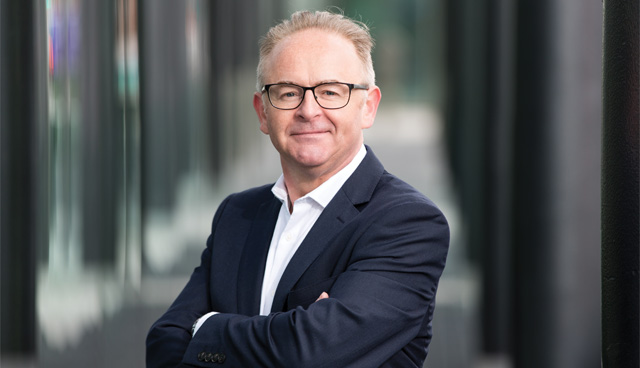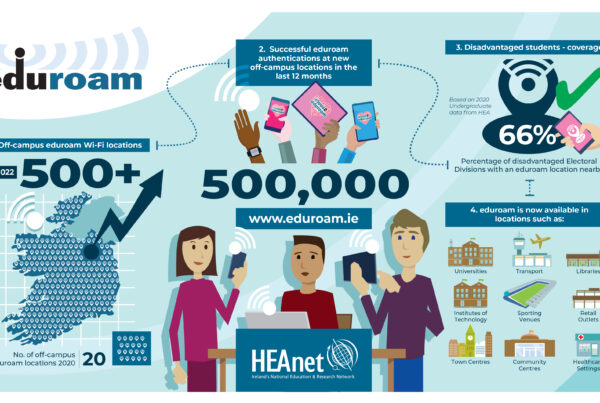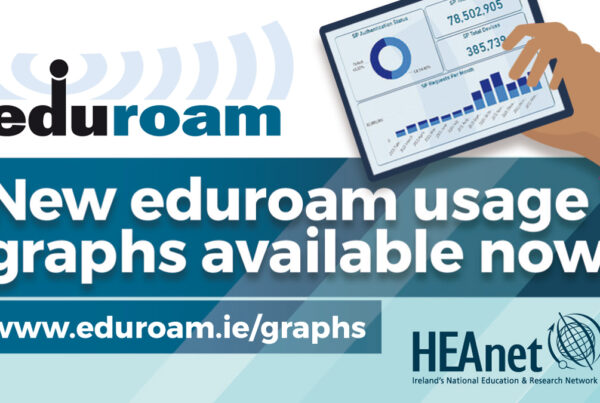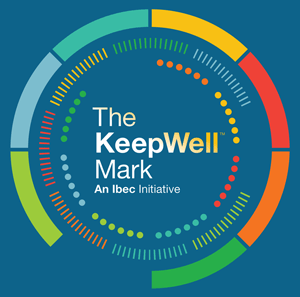
Ronan Byrne, our Interim CEO and Chief Technology Officer, spoke to eolas about expanding the eduroam service beyond the confines of the college campus and partnering with both the public and the private sectors to assist third-level students studying remotely during a pandemic.
HEAnet is Ireland’s national research and education network (NREN). It is a not-for-profit entity, owned and funded by the education sector whose role is to deliver connectivity and ICT services to all publicly funded universities, institutes of technology and other colleges, in addition to all of Ireland’s 4,000 schools. One notable stand-out service offering during these pandemic times is HEAnet’s management of the eduroam service, the free Wi-Fi service available at publicly funded Irish third-level campuses. eduroam will be a very familiar service to any students to have graduated in the past 10 years.
eduroam, short for education roaming, is a Wi-Fi service set identifier (SSID) that is broadcast over a Wi-Fi network. The service is available to students, staff and researchers from participating HEIs. Similar to the way a mobile device immediately connects to a known home Wi-Fi network when its owner enters the entrance hall, a student’s phone automatically connects to eduroam as they walk onto a campus, or any other location where eduroam is available. eduroam is preconfigured on the student’s device, meaning there is no reconfiguration needed, or indeed no cost to use the service, as they roam from one location to another. The service is managed nationally by HEAnet, and its fellow NRENs in their respective countries around the globe.
“HEAnet connects students, staff and researchers nationally but we also offer them connectivity to Europe and globally via GÉANT, the pan-European association of NRENs, and I mention that because that’s where the eduroam initiative is coordinated from within Europe,” Byrne says.
“The ambition of our latest connectivity initiative, eduroam Everywhere, is to extend eduroam coverage beyond the college campus to other public infrastructure and public buildings, but also to private commercial infrastructure such as retail outlets and conference centres. There is a big challenge to address in making quality broadband available for every higher education learner in the country. We wish to make eduroam available nearer to people’s remote location and help them to gain access to the internet and thus enable access to the materials they need to continue their education.
“The advent of Covid-19, and the restrictions on campus attendance, has served as a real-world catalyst for the need to expand eduroam availability. We’ve received excellent support from Minister Simon Harris in making other public infrastructure providers more aware of the service,” Byrne says.
“The Minister has enabled us to develop partnerships with other public infrastructure providers and agencies across the wider public sector, including the county councils, the Local Government Management Agency (LGMA), the Department of Rural and Community Development, the Office of the Government Chief Information Officer (OGCIO), and also the Union of Students in Ireland (USI). We’ve had great engagement with the county councils across the country, with eduroam now available in many public libraries. We continue to add new libraries to the national eduroam map as we speak, with the eduroam service available inside but also outside the library building using external Wi-Fi antennae. Additionally, we are planning to make eduroam available in public spaces such as town centres and parks.
“Working with the Department of the Environment, Climate and Communications and the OGCIO, we plan to make eduroam available at Broadband Connection Points (BCPs) under the National Broadband Plan (NBP) and we anticipate that these will come online in the very near future. As the objective of the NBP is to target areas of the country with lesser broadband service, there is a natural fit for eduroam to be available at these geographic locations.”
While a key pillar of the eduroam expansion strategy is to leverage existing public infrastructure, Byrne is keen to stress that HEAnet is also actively seeking private sector collaborators.
“We have already connected the student accommodation in Tralee, the Convention Centre Dublin and the conference suite at Croke Park which has been hosting a cohort of RCSI students. Likewise, we anticipate that Páirc Uí Chaoimh in Cork will come on stream shortly,” Byrne says. “The CHQ retail outlet in the IFSC is also connected. We continue to target coffee shops, restaurants, and anywhere that lends to convenient connectivity for students, even if that’s just a short visit to upload an assignment, for example, or to download educational content on the go. Each of these measures are significant when you’re competing for broadband at home, or are experiencing high mobile data tariffs, or you simply do not have coverage at your location.”

With the support of the Department of Transport, a pilot scheme on some Dublin Bus routes is now also in operation. Trialling eduroam across transport types is also a current priority for the eduroam Everywhere project. “We are exploring all good eduroam location candidates beyond the college campuses, and we are actively encouraging good suggestions from the commercial market. We need support to achieve our goals and we are keen to work with any organisations that wish to include their public Wi-Fi in the eduroam service.” Byrne explains, adding: “The project objective is to make eduroam as ubiquitous as we can for the benefit of students. It’s about leveraging public and private infrastructure that’s already in place, particularly to ameliorate connectivity issues during the pandemic, but we see the benefit continuing beyond that. Blended learning is likely to persist into the future with a balance of on-campus attendance complemented by some remote learning aspect.”
However, Byrne recognises that the expansion of eduroam availability will not solve all of the connectivity problems experienced by Ireland’s students during this pandemic chapter. HEAnet pursue other initiatives to assist students including the operation of the HEAnet online store, which offers discounted laptops, broadband deals and software components for third-level students. HEAnet also manage centralised procurement of ICT services for the sector, a feature procurement from last year being the expedited bulk order of laptops for disadvantaged students prior to academic term commencement in late summer 2020.
“eduroam Everywhere is an ambitious project but is not a silver bullet for the connectivity challenge,” Byrne says. “The availability of devices is also an issue and we have been working with various stakeholders on this since this time last year. An aggregated procurement opportunity arose last year with the advent of the July stimulus provision coming via Minister Harris’ department. Against a backdrop of unprecedented global demand for laptop components, we aggregated a bulk order of 16,700 laptops for disadvantaged students from across a breadth of education institutions. This was a great illustration of a collective effort by the many educational institutions involved, coupled with great support by the suppliers too, notably Dell, Microsoft, and Intel.”
“The merit of aggregating ICT orders may well persist beyond Covid times, as I think there are benefits to doing these things collectively and more efficiently. It’s a classic example of the HEAnet purpose, as a shared service provider for the sector. We work on behalf of our clients and together with our clients, leveraging our collective strengths in a trusted way.”
Collaboration has been key to the success of HEAnet since its inception and this will be key to its future success, as Byrne concludes: “We will continue to work closely with our clients, with the Department of Education, and with the newly formed Department of Further and Higher Education, Research, Innovation and Science to develop and leverage the national asset that is HEAnet. It is essential that we continue to develop this national resource, to foster high value collaborations across the sector, and to further enable the digital ambitions of the sector, and Ireland generally.”





